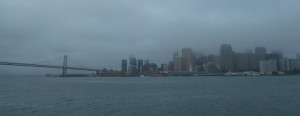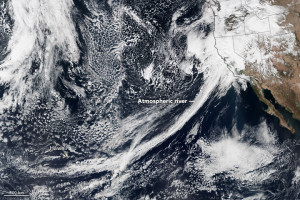How California’s Record-Setting Rains Are Reshaping the Ecology of San Francisco Bay
By Ryan Greene, science writing intern

The San Francisco skyline as seen from San Francisco Bay. Credit: Ryan Greene/SERC
The Smithsonian Environmental Research Center’s (SERC) largest West Coast outpost sits on San Francisco Bay in Tiburon, California. The Tiburon branch, affectionately known as SERC-West, serves as the nexus of SERC’s research activities on the western coast of North America. At a whopping 2,462 miles from SERC’s main campus on the Chesapeake Bay in Maryland, SERC-West can feel a bit remote. In an attempt to bridge this distance, we’re launching “Tidings From the Sunset Coast,” a summer story series about all things SERC-West. The first snippet is a story about the wildly wet winter California experienced this year and what all this fresh water means for the marine life in San Francisco Bay. Enjoy!

Image from NASA’s VIIRS satellite show one of many “atmospheric rivers” which slammed the California coast this past winter. Credit: Jesse Allen and Joshua Stevens/NASA Earth Observatory
When it comes to rain in California, the last few years have been a feast-or-famine affair. After a bitter drought that sported some of the driest years on record, this past winter brought more precipitation than the northern parts of the state have ever documented. To put it lightly, the weather has been extreme. And while the wet winter has refilled reservoirs and beefed up the snowpack, leading Governor Jerry Brown to end the drought state of emergency in all but four counties, it has also wreaked its fair share of havoc.
Here at SERC-West, scientists have been following another part of this story: the bombardment of freshwater runoff that inundated San Francisco Bay this winter. All the fresh water from the rain drastically reduced the saltiness (a.k.a. salinity) of the Bay. For many plants and animals used to saltier water, this was simply too much to handle. The devastation has been widespread, and according to ecologist Andy Chang, who currently heads up SERC-West, in some areas, the changes to the ecosystem might be less than fleeting.
“We’re kind of expecting to see local extinctions of some species that were here before,” he says. Click to continue »

